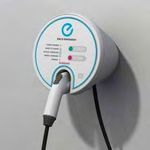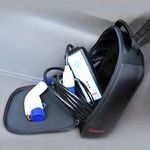GETTING A CHARGER INSTALLED IN YOUR APARTMENT OR CONDO
←
→
Page content transcription
If your browser does not render page correctly, please read the page content below
GETTING A CHARGER INSTALLED IN YOUR APARTMENT OR CONDO As the proud owner of a Nissan LEAF®, you might be thinking about the most convenient way to keep it charged and ready to go. While most homeowners typically install personal EV chargers, those who live in apartment buildings or condominium complexes often face more of a challenge when it comes to at-home charging. If your complex doesn’t already have EV chargers installed, or is looking to expand its current EV offerings, you’re in luck, because Nissan is here to help guide your homeowners association (HOA) or building owner through the process. In the following pages you’ll find information about how Nissan is helping LEAF owners across the country with getting EV chargers. Whether you own your own condominium or rent from someone else, Nissan wants to help you get a charger installed. We’ve put these documents together to help you get the conversation started with your HOA or building owner and show them the benefits of having an EV charger in their building based on whether you rent or own your property. The goal is to answer any of their initial questions and outline the steps needed for charger installation. Remember, there’s strength in numbers. If you have fellow EV owners at your complex, even ones you haven’t met yet, reach out and get them involved. Having an EV charger installed benefits everyone. And don’t forget, Nissan is here to help guide your complex through the process. You’ll find contact information for Nissan inside. Just reach out with any additional questions or information you might need.
YOUR GUIDE TO MORE PLUGGED-IN TENANTS Want some great people in your buildings? Install EV charging stations. Nissan is committed to helping you make it happen.
WHY SHOULD I INSTALL CHARGERS? The number of electric vehicles on the roads is growing every month, and with it are the numbers of drivers looking for access to chargers. While many EV owners rely on access to public or workplace chargers, many look for the convenience of having their vehicles charged at home. Whether you are looking to install your building’s first EV charger or expand on current charger offerings, the availability of EV chargers benefits everyone. • Your current EV-owning tenants will be happy to have another location to charge every day. Happy tenants = better tenants. • You’ll have an advantage over other properties in attracting smart, forward-thinking tenants. • With one simple move, you’ll position your buildings as modern, tenant-focused and environmentally conscious. In other words: cool.
INSTALLATION PREPARATION
With installation of EV chargers on your property, there are a
few things that you should consider before you get started:
Assess your property. Does your building have assigned parking spaces
for your tenants or do you have a more open parking plan? Is there a
common parking area where an EV charger could be placed and shared by
tenants?
ocate the electrical panels. How close are parking areas to existing
L
electrical panels? Having chargers located in close proximity to existing
electrical services reduces the amount of installation work needed.
Consult your electric utility company. Many utilities offer incentive
programs for EV chargers and can provide guidance on how to take
advantage of any EV electrical tariffs.
Talk to the installation company. A local installer or electrical contractor
should perform a site assessment and provide you with installation options
and other potential impacts.
Consider the operating cost. Annually, the cost of an EV charger are
relatively low, but is this something that your tenants or the users of the
charger can help contribute to?
Inform your tenants. If you’re ready to commit to charger installation, let
your tenants know. It might also be helpful to establish a set of rules for your
tenants to help manage charger usage.WHICH CHARGER MIGHT BE RIGHT
FOR YOUR TENANTS?
Whether your property is a small set of apartments or a larger complex, there are
different levels of chargers that are available to suit the needs of your tenants.
LEVEL 1 CHARGER Estimated Charge Time
6-18 hours1
If you have existing electrical outlets, this is the easiest and most basic
Estimated Miles Per Hour of Charging
type of charging you could provide. Level 1 is the slowest charging rate 2-5 miles2
and might be suitable for some drivers, but it is not ideal for properties Impact on Environment
that may have multiple electric vehicles. 1.2 kW, the equivalent of one toaster3
LEVEL 2 CHARGER Estimated Charge Time
Provides approximately five times the charging power over Level 1, 3-8 hours1
decreasing the typical full-charge time, depending on the vehicle. Level 2 Estimated Miles Per Hour of Charging
10-20 miles2
chargers typically require the installation of wall-mounted chargers and a
Impact on Environment
dedicated circuit (similar to a clothes dryer), but it is the perfect charger for 3.3-7.2 kW, the equivalent of 3-6 toasters3
complexes with multiple electric vehicles that require a shared charger.
DC QUICK CHARGER Estimated Charge Time
Less than 30 minutes1
An off-board device that connects directly to a vehicle’s high-voltage
Estimated Miles Per Hour of Charging
battery, allowing for high-power transfer that can typically charge to 60-80 miles2
approximately 80% in under 30 minutes. This type of charger should be Impact on Environment
considered if you have, or anticipate having, multiple EV drivers on your 35-50 kW, the equivalent of 42 toasters3
property, or cannot install multiple Level 2 chargers.
1 Charge times may vary.
2 Miles per hour of chargring may vary. Based on typical rates for light-duty vehicles provided by U.S. Department of Energy (http://www.afdc.energy.gov/fuels/electricity_infrastructure.html).
3 Equivalents based on typical wattage of EV charger compared to typical wattage for household appliances provided by U.S. Department of Energy (http://energy.gov/energysaver/articles/estimating-appliance-and-
home-electronic-energy-use).HOW NISSAN CAN HELP
We understand that the prospect
of installing EV chargers on your
property might seem complicated
and costly. It’s easier than you
might think, and Nissan is here
to help:
• Provide information and resources about
EVs and charging solutions.
• Conduct on-site EV and charging
education for residents.
• Access to ride-and-drive events for
prospective EV purchasers.
• Help answer questions pre- and post-
installation.ADDITIONAL RESOURCES
Want to find some additional information about
EV charging? Here are some additional resources
that can help:
Nissan LEAF Owners Portal
http://www.nissanusa.com/owners
Nissan LEAF Facebook
http://www.facebook.com/nissanleaf
US Department of Energy
http://energy.gov/eere/vehicles
SO WHAT’S MY
NEXT STEP?
First things first. Let’s determine if chargers
are a viable option for your properties.
Just contact Nissan at:
877-664-2738 (Option 5) or
evcustomersupport@my-nissan-usa.comYOUR GUIDE TO MORE
PLUGGED-IN TENANTS
Want some great people in your buildings? Install EV quick chargers. Nissan is committed to
helping you make it happen.
WHAT ARE THE BENEFITS OF INSTALLING CHARGERS?
• Your current EV-owning tenants will be happy to have another location to charge every day. Happy tenants
= better tenants.
• You’ll have an advantage over other properties in attracting smart, forward-thinking tenants.
• With one simple move, you’ll position your buildings as modern, tenant-focused and environmentally
conscious. In other words: cool.
WHAT SHOULD BE CONSIDERED WITH EV CHARGERS?
• Assess your property. Do you have assigned parking spaces or a more open parking plan? Is there a
common parking area where an EV charger could be placed?
• Locate the electrical panels. Having chargers located in close proximity to existing electrical services
generally reduces the amount of installation work needed.
• Talk to the installation company. Consult with a professional to assess your options and other potential
impacts.
• Consider the operating cost. Is the cost of an EV charger something that tenants or the users of the charger
can help contribute to?
• Inform your tenants. If you’re ready to commit to charger installation, let your tenants know.
• Talk to your utility. They can give you the latest information about rebates, tariffs and maybe even tips on
how to keep your electricity costs low.
HOW IS NISSAN GOING TO CONTRIBUTE?
• Provide information and resources about EVs and charging solutions.
• Conduct on-site EV and charging education for tenants.
• Help answer questions pre- and post-installation.
SO WHAT’S MY NEXT STEP?
First things first. Let’s help you determine your options for EV chargers on your property. Just contact
Nissan at: 877-664-2738 (Option 5) or evcustomersupport@my-nissan-usa.comYou can also read



























































